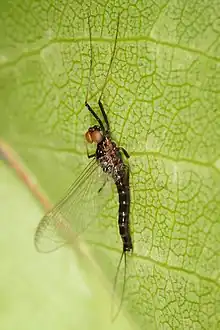Leptophlebiidae
Leptophlebiidae is a family belonging to the Ephemeropterans that are commonly known as the prong-gilled mayflies or leptophlebiids. It is the only family in the superfamily Leptophlebioidea.[1] There are around 131 genera and 640 described species.[2] Leptophlebiids are easily recognized by the forked gills present on the larvae's abdomen, thus their common name.
| Leptophlebiidae Temporal range: | |
|---|---|
 | |
| Male imago of undetermined Atalophlebia species from Swifts Creek, Victoria (Australia) | |
_Figure_5.jpg.webp) | |
| Nymph of Habrophlebia djurdjurensis | |
| Scientific classification | |
| Domain: | Eukaryota |
| Kingdom: | Animalia |
| Phylum: | Arthropoda |
| Class: | Insecta |
| Order: | Ephemeroptera |
| Suborder: | Furcatergalia |
| Family: | Leptophlebiidae Banks, 1900 |
| Genera | |
|
Numerous, see text | |
Larvae
Leptophlebiid larvae live in freshwater streams and lakes eating detritus and/or algae. North American species generally cling to rocks, few physiologically equipped for skilled swimming. Like all Ephemeropteran larvae, fragile gills line the lateral margins of their abdomen. Some genera grow mandibular tusks like their burrowing relatives, the Ephemeridae, Polymitarcyidae, and Potamanthidae.
Selected genera
- Acanthophlebia Towns, 1983
- Atalophlebia
- Choroterpes
- Farrodes
- Habrophlebia
- Habrophlebiodes
- Leptophlebia
- Miroculis
- Neochoroterpes
- Paraleptophlebia
- Thraulodes
- Traverella
- †Kachinophlebia Burmese amber, Myanmar, mid-Cretaceous (Albian-Cenomanian).[2]
- †Conovirilus Lebanese amber, Early Cretaceous (Barremian)
References
- "Ephemoptera: Mayflies". The Tree of Life Web Project. 2002. Retrieved 2015-05-31.
- Chen, Zhi-Teng; Zheng, Xuhongyi (December 2022). "First mayfly larva of Leptophlebiidae (Insecta: Ephemeroptera) in mid-Cretaceous Kachin amber, northern Myanmar". Cretaceous Research. 140: 105354. doi:10.1016/j.cretres.2022.105354. S2CID 251962121.
External links
 Data related to Leptophlebiidae at Wikispecies
Data related to Leptophlebiidae at Wikispecies Media related to Leptophlebiidae at Wikimedia Commons
Media related to Leptophlebiidae at Wikimedia Commons